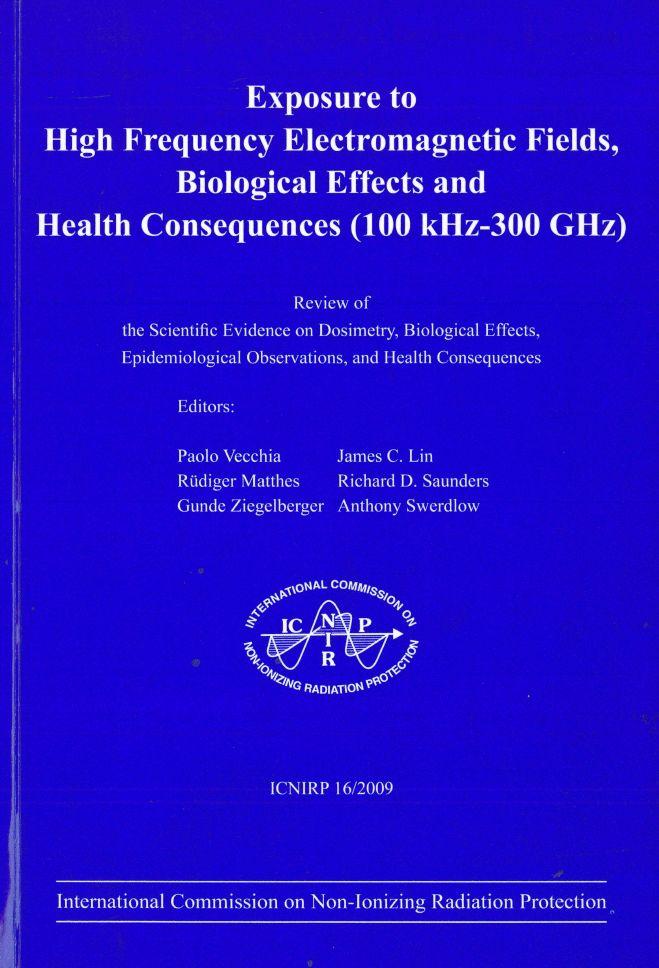High Frequency Review (PDF) - 2009
978-3-934994-10-2
EUR 60,00

Format: Available as PDF and hard cover. Upon ordering you will receive both formats.
Content: This document is a review of the scientific evidence concerning exposure to high frequency electromagnetic fields and the resulting consequences for health.
Since the 1998 publication of the ICNIRP guidelines on limiting exposure to electromagnetic fields, there have been important studies published, that needed detailed analysis and discussion to determine their implications for health. The review aims at providing input to the respective health risk assessment undertaken by the World Health Organization. Together with the review of the scientific evidence in the ELF range this forms the basis for a thorough reevaluation of ICNIRP's science based guidance on limiting exposure to EMF.
Table of Contents
I. DOSIMETRY OF HIGH FREQUENCY ELECTROMAGNETIC FIELDS
Summary
Sources
Measurement
Interaction mechanisms
Dosimetry
Physical Characteristics
Introduction
Quantities and units
Sources and Exposures
Introduction
Natural high frequency fields
Man-made fields
Exposure systems for laboratory studies
RF Measurement
Introduction
Principles of measurements
Characteristics of Electromagnetic Fields
Instrumentation
Calibration of external field measurement equipment
Mechanisms of interaction
RF exposure and coupling into biological systems
Biophysical mechanisms of interaction
Dosimetry
Introduction
Biological models and materials
Dosimetry of contact and induced currents
Specific absorption rates (SAR)
Temperature elevation
Uncertainties of RF dosimetry
Other topics
References
II. REVIEW OF EXPERIMENTAL STUDIES OF RF BIOLOGICAL EFFECTS
Introduction
Biological Evidence for Interaction Mechanisms
Biophysical studies
Biochemical studies
Summary on mechanisms
Cellular Studies
Introduction
Genotoxicity
Studies on non genotoxic cellular effects
Cell transformation
Summary on cellular studies
Animal Studies
Genotoxicity
Cancer
Reproduction and development
Nervous system
Auditory system
Endocrine system
Cardiovascular system
Immunology and hematology
Skin
Eye
Summary on animal studies
Human Studies
Nervous system
Endocrine system
Cardiovascular function and thermoregulation
Summary on human studies
Summary and Conclusions
Summary
Conclusions
References
III. EPIDEMIOLOGY
A. Epidemiology of Health Effects of Radiofrequency Exposure
Introduction
Exposure
Sources of exposure
Distribution of exposure in the population
Epidemiological considerations in exposure assessment
Mechanisms
Outcomes
Review of Studies on Occupational Exposure
Cancer
Other outcomes
Review of Studies on Environmental Exposure from Transmitters
Review of Studies on Mobile Phone Use
General Conclusions and Recommendations
References
B. Epidemiologic Evidence on Mobile Phones and Tumor Risk: a Review
Methodologic Considerations
Exposure characteristics
Tumor location and laterality of tumor in relation to habitual side of phone use
Induction and latency periods
Definition of cases
Selection of controls
Response rates
Precision of risk estimates
Methods of Studies
Glioma: Results and Interpretation
Meningioma: Results and Interpretation
Acoustic Neuroma: Results and Interpretation
Salivary Gland Tumors: Results and Interpretation
Conclusions
References
Summary
Sources
Measurement
Interaction mechanisms
Dosimetry
Physical Characteristics
Introduction
Quantities and units
Sources and Exposures
Introduction
Natural high frequency fields
Man-made fields
Exposure systems for laboratory studies
RF Measurement
Introduction
Principles of measurements
Characteristics of Electromagnetic Fields
Instrumentation
Calibration of external field measurement equipment
Mechanisms of interaction
RF exposure and coupling into biological systems
Biophysical mechanisms of interaction
Dosimetry
Introduction
Biological models and materials
Dosimetry of contact and induced currents
Specific absorption rates (SAR)
Temperature elevation
Uncertainties of RF dosimetry
Other topics
References
II. REVIEW OF EXPERIMENTAL STUDIES OF RF BIOLOGICAL EFFECTS
Introduction
Biological Evidence for Interaction Mechanisms
Biophysical studies
Biochemical studies
Summary on mechanisms
Cellular Studies
Introduction
Genotoxicity
Studies on non genotoxic cellular effects
Cell transformation
Summary on cellular studies
Animal Studies
Genotoxicity
Cancer
Reproduction and development
Nervous system
Auditory system
Endocrine system
Cardiovascular system
Immunology and hematology
Skin
Eye
Summary on animal studies
Human Studies
Nervous system
Endocrine system
Cardiovascular function and thermoregulation
Summary on human studies
Summary and Conclusions
Summary
Conclusions
References
III. EPIDEMIOLOGY
A. Epidemiology of Health Effects of Radiofrequency Exposure
Introduction
Exposure
Sources of exposure
Distribution of exposure in the population
Epidemiological considerations in exposure assessment
Mechanisms
Outcomes
Review of Studies on Occupational Exposure
Cancer
Other outcomes
Review of Studies on Environmental Exposure from Transmitters
Review of Studies on Mobile Phone Use
General Conclusions and Recommendations
References
B. Epidemiologic Evidence on Mobile Phones and Tumor Risk: a Review
Methodologic Considerations
Exposure characteristics
Tumor location and laterality of tumor in relation to habitual side of phone use
Induction and latency periods
Definition of cases
Selection of controls
Response rates
Precision of risk estimates
Methods of Studies
Glioma: Results and Interpretation
Meningioma: Results and Interpretation
Acoustic Neuroma: Results and Interpretation
Salivary Gland Tumors: Results and Interpretation
Conclusions
References
